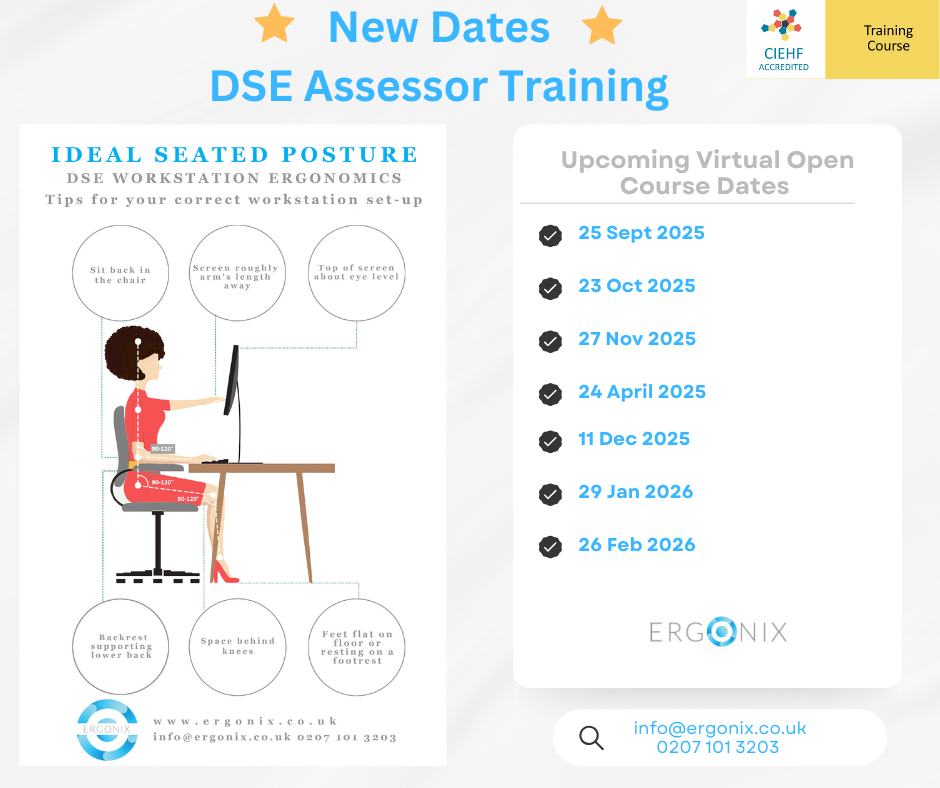 In today’s sedentary lifestyle, maintaining good posture isn’t just about exuding confidence; it’s about safeguarding your health and optimising your performance. Here’s why your posture matters more than you might think, along with actionable tips to achieve and maintain optimal alignment.
In today’s sedentary lifestyle, maintaining good posture isn’t just about exuding confidence; it’s about safeguarding your health and optimising your performance. Here’s why your posture matters more than you might think, along with actionable tips to achieve and maintain optimal alignment.
The Pitfalls of Poor Posture:
Chronic pain
Sitting in slouched positions can strain muscles and joints, leading to tightness and pain in the lower back, neck, shoulders, and wrists. Over time, this discomfort can become persistent and debilitating, interfering with daily activities and diminishing overall quality of life.
Reduced productivity
Discomfort caused by poor posture can distract and drain energy, hindering focus and productivity. When preoccupied with nagging aches and pains, it’s challenging to concentrate on tasks at hand, leading to decreased efficiency and effectiveness in both professional and personal endeavours.
Health risks
Long-term poor posture can contribute to musculoskeletal disorders, respiratory issues, and even mental health concerns like stress and anxiety. The strain placed on muscles and ligaments from improper alignment can exacerbate existing conditions or create new ones, impacting our physical health profoundly. Additionally, chronic discomfort can take a toll on mental wellbeing, leading to lack of sleep, increased tiredness, stress, and anxiety.
Decreased balance
Poor posture not only affects our skeletal and muscular systems but also compromises our balance and stability. Slouching or hunching forward shifts our body’s centre of gravity, making it harder to maintain equilibrium. Over time, this can increase the risk of trips, slips, and falls, especially in older adults, potentially leading to injuries and decreased mobility.
Digestive issues
The impact of posture on digestion is often underestimated. Improper alignment can compress the digestive organs, leading to issues such as slowed digestion, bloating, and discomfort. Additionally, poor posture can impede the natural flow of food through the gastrointestinal tract, potentially exacerbating conditions like acid reflux and constipation. By maintaining good posture, we can support optimal digestive function and promote better overall gut health.
The Power of Good Posture:
Enhanced Physical Health
Proper alignment safeguards your body’s structural integrity, promoting healthy joint function, reducing strain on muscles, and alleviating tension throughout the body. This can help prevent musculoskeletal issues and improve overall physical wellbeing.
Increased Energy and Vitality
Good posture facilitates improved breathing and circulation, boosting oxygen flow throughout the body. This increased oxygenation enhances energy levels, alertness, and productivity.
Confidence and Presence
Standing tall with good posture projects confidence to others and boosts self-esteem and presence in any situation. By embodying strong, upright posture, you exude an air of authority and command attention with ease.
Improved Balance
Good posture contributes to better balance and stability, reducing the risk of falls and injuries, especially as we age. By distributing body weight evenly, proper alignment enhances balance.
Reduced Intradiscal Pressure
Proper posture helps alleviate pressure on intervertebral discs, reducing the risk of disc herniation and related back problems. By maintaining a neutral spine position, compression forces on the spinal discs are minimised, promoting spinal health.
Enhanced Digestion
Surprisingly, posture can also impact digestion. Sitting and standing with good posture allow for optimal positioning of the digestive organs, facilitating better digestion and absorption of nutrients.
Improved Cognitive Function
Beyond its physical benefits, good posture has been linked to improved cognitive function. By promoting better circulation and oxygenation to the brain, proper alignment enhances mental clarity, focus, and cognitive performance.
Investing in good posture isn’t just about appearances; it’s a cornerstone of optimal health, vitality, and success. By incorporating these posture principles into your daily routine, you can enjoy a myriad of benefits, from improved physical wellbeing to enhanced confidence and cognitive function. Prioritise your posture today and reap the rewards for a lifetime.
Improving Your Posture: Practical Tips for Desk-Based Professionals
If you spend long hours at a desk, prioritising posture is essential for maintaining overall health and wellbeing. Here’s a comprehensive guide to improving your posture, including exercises, lifestyle adjustments, and ergonomic tips tailored for desk-based professionals:
Stay Active Throughout the Day
- Take regular breaks to stand up, stretch, and move around.
- Set reminders to change positions every 30-60 minutes to prevent prolonged sitting.
- Incorporate physical activity into your daily routine, such as walking, cycling, or participating in exercise classes.
Strengthen Your Core and Back Muscles
- Incorporate targeted exercises like planks and Superman to build core strength and stability.
- Incorporate yoga, Pilates, or swimming into your routine to improve strength and promote better posture.
Stretch Tight Muscles
- Combat the effects of prolonged sitting by regularly stretching tight muscles, focusing on the chest, shoulders, hip flexors, and hamstrings.
Practice Proper Ergonomics
- Ensure your workstation is set up ergonomically to support good posture.
- Sit with your back against the chair’s backrest and adjust the height of your chair to your elbow angle (90-120 degrees). If your feet don’t reach the floor, add a footrest .
- Position the top of your computer monitor at eye level and directly in front of you (about an arm’s length away) to avoid you slouching over your desk, improve your posture and reduce pressure on the back, neck and shoulders.
- Invest in ergonomic furniture and accessories, such as an adjustable chair, to customise your workstation for optimal comfort and alignment.
Stay Hydrated and Nourished
- Drink plenty of water throughout the day to keep muscles and joints hydrated and flexible.
- Maintain a balanced diet rich in nutrients to support overall musculoskeletal health and reduce inflammation.
By incorporating these practical tips into your daily routine, you can gradually improve your posture, reduce the risk of musculoskeletal issues, and enhance your overall wellbeing, even in a desk-based job. Remember to be consistent and patient with your efforts, as posture improvement is a gradual process that yields long-term benefits.
At Ergonix, we are dedicated to helping organisations create safer, healthier, and more productive work environments through our DSE (Display Screen Equipment) Workstation Assessments, Accredited DSE Training Courses and Wellbeing Workshops. Together, let’s continue to prioritise the wellbeing of our employees and build workplaces where physical and mental health matters.
If you’d like to learn more about how our services can support your organisation’s workplace wellness initiatives, please don’t hesitate to get in touch.







